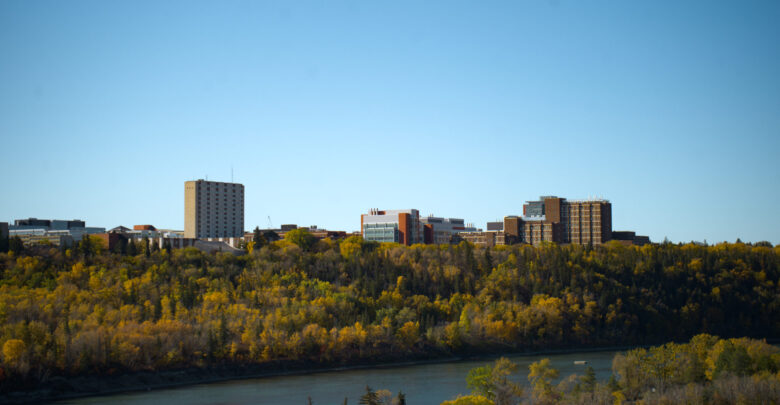Alberta’s post-secondary panel report proposes new funding framework
The Mintz panel report includes 11 recommendations for the province's post-secondary sector.
 Leah Hennig
Leah HennigOn October 9, the Government of Alberta‘s Expert Panel on Post-Secondary Institution Funding and Alberta’s Competitiveness released its final report and recommendations for post-secondary institutions. The proposal includes new funding frameworks, regulation of tuition fee increases, and adherence of institutional neutrality.
The five-member panel, chaired by Canadian economist Jack Mintz, was appointed in December 2024 to review and evaluate provincial post-secondary fundings models. This includes both public and independent post-secondary institutions.
The University of Alberta Student Union’s (UASU) vice-president (external), Abdul Abbasi, presented to the panel as one of the two Council of Alberta University Students (CAUS) representatives.
According to Abbasi, the UASU has been pushing for more funding for many years. This report shows the panel agrees with that since many of the recommendations aligns with the proposals and initiatives done by CAUS, he said.
“We’re excited to see how this will go, and looking forward to having those conversations with the ministry,” Abbasi said.
The final report was submitted to the Minister of Advanced Education in August 2025.
“With this set of recommendations, the Panel is confident that Alberta’s post-secondary system will not only enhance its competitiveness with the best institutions in the world but will provide the foundation for a system that proactively responds to challenges, embraces opportunities, and provides Alberta’s students with the best possible preparation for their futures,” the report said.
The new “cluster” funding model
In the first recommendation, the panel proposed a new “cluster” funding model. This model takes into consideration factors including enrolment numbers, performance, and base funding.
Since disciplines that include clinical placement, laboratory instruction, and technical training require more investment, this new method would address the costs and ensure that funding is being distributed accordingly.
In the report, the panel acknowledged that implementing a new funding framework will require additional government funding.
New approach to tuition fee increases
The report states that the current two per cent annual cap on domestic tuition increases should be replaced with an approach that would guarantee first-year students that “their tuition would not increase by more than two per cent per year for the duration of their program.”
The recommendation seeks to provide certainty to students, according to the report.
“Each year, institutions would have the autonomy to set the tuition rate for new, first-year students, up to the maximum amount for each cluster set by Advanced Education.”
The panel also suggested more government assistance for students in the form of non-repayable grants rather than taking on more loans. This would help students have an more affordable post-secondary education.
Flanagan comments on enrolment growth
On October 23, President and Vice-chancellor Bill Flanagan, released a response to the panel’s report.
“The U of A welcomes the Panel’s call for a funding framework that links investment to enrolment growth, performance, and research impact,” Flanagan’s statement read.
“These reforms align closely with our recommendations to the Panel and with our long-term vision to expand access, strengthen Alberta’s innovation economy, and ensure that Alberta competes successfully with the best in the world.”
Flanagan noted the report’s projection that post-secondary enrolment is expected to increase by 21 per cent by 2033–34. Edmonton post-secondary institutions are predicted to enrol approximately 18,000 more students.
Flanagan said that this projected growth aligns with the anticipated growth outlined in the U of A’s 10-year strategic plan, SHAPE, which anticipates a total headcount of 60,000 students by fall 2030.
The projected increase of international students was interrupted in 2024 due to new regulations on Canada’s student visa program, he noted.
“These projections reinforce Alberta’s strong demographic momentum and the U of A’s readiness to expand access, talent, and innovation to meet the province’s long-term needs,” Flanagan said.
All post-secondary institutions are to adhere to the principle of neutrality
Additionally, the government expects all public post-secondary institutions to “remain neutral on issues beyond their mandates and to encourage freedom of expression, critical thinking, discussion, and debate.”
According to the panel, institutional neutrality will protect the freedom of expression and ensure intellectual diversity.
Flanagan did not mention this recommendation in his response.
However, he did comment on the regulation of post-secondary institutions by the government.
“The Panel recommends that the government review the range of institutional controls currently in place to provide significantly greater flexibility and autonomy,” Flanagan said.
“It calls for a substantial reduction in reporting requirements, limiting them to those necessary for accountability and performance measurement, and for co-ordination across ministries to reduce duplication,” Flanagan added.




